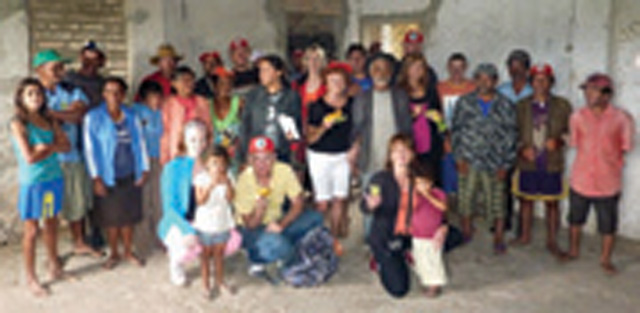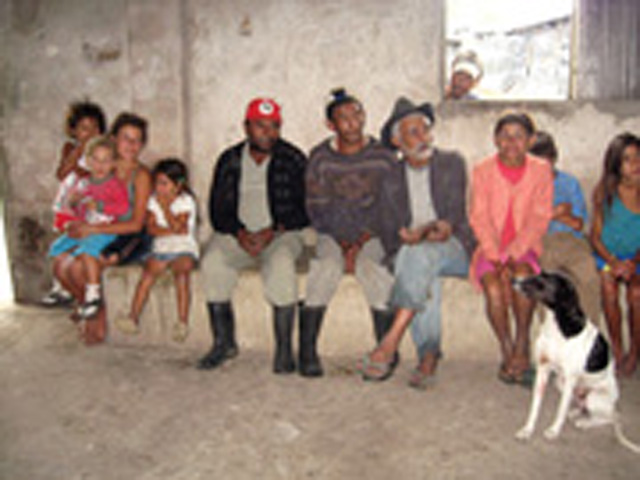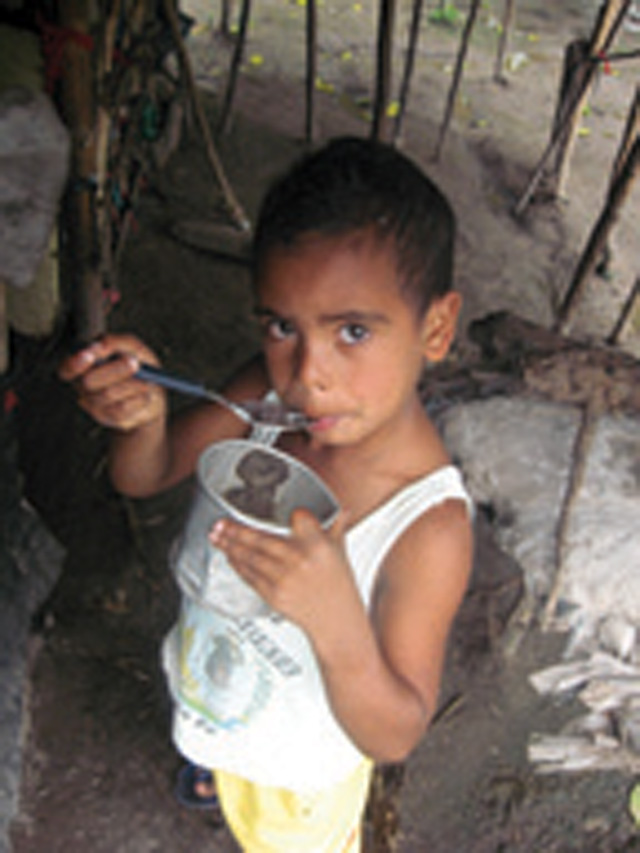A gift of burnt corn
Witnessing God’s love and presence among the most vulnerable people
By Brenda Chaput-Saltel
January/February 2011
Return to Table of Contents
Print Article
I am standing on the side of the road. It is 7:00 a.m. The early heat of the Brazilian sun is coursing over my eyelids. It compares to the mid-afternoon Canadian prairie sunshine that I know so well.
As I stand there, eyes closed, on the sidewalk outside the pousada (hotel), I wonder, How is it that a small town prairie girl from Manitoba finds herself in Recife, Brazil, on this exact space, at this precise moment?
 After our meeting with the community of Fazenda Jabuticaba, we were offered a simple meal of roasted corn on the cob. One hundred families live beneath the black canvas tents, but that day most were away at market.
After our meeting with the community of Fazenda Jabuticaba, we were offered a simple meal of roasted corn on the cob. One hundred families live beneath the black canvas tents, but that day most were away at market.
My moment of surreal contemplation closes as I am snapped back to reality by a warm, furry sensation on the bare skin of my knee. I smile, already knowing the source, and open my eyes. At my feet is a new friend—a pitiful, big-eyed dog, boney and street wise, his fur matted. He in no way resembles the fatty farm animals I am used to seeing back home. He is an appalling affair who has taken a liking to me and has been following me for several days on my morning run along the Brazilian coast. My run has become a time of reflection on recent days and anticipation for the day yet to come.
This morning, the agenda for the day is put forward immediately. As I cross the street, dog in tow, I see two people still asleep in the overhang of a building. They are lying on strips of cardboard, their worn, bare feet protruding toward me. This sight is not usual or acceptable to my naive Canadian eyes, but here in Brazil, it’s part of the sad reality.
My morning run has preceded many of these kinds of days. I have seen families living in shacks, in tents, or homeless. I have seen mothers raising their children with little food, with no shoes, without clean water. The impact of this kind of firsthand witnessing to the injustices that are suffered by so many is difficult to describe. It is the gut wrenching, heart tightening feeling that comes from sharing, even if only for a brief moment, in their suffering.
 Pausing from their day’s work, the people gather in their community centre to welcome us and share stories of their struggle for land.
Pausing from their day’s work, the people gather in their community centre to welcome us and share stories of their struggle for land.
This feeling was never as greatly back of a dirty old truck, along a maze of muddy trails, to find a com-munity of landless peasants. We were welcomed into their homes, nothing more than stick tents covered in black garbage bag plastic. We were introduced to their most precious treasures—their children; barefooted little creatures eating dry manioc flour out of dented tin cups; children who were born into these conditions and who have never known any life apart from this. We were welcomed wholeheartedly. The peasants shared their stories of survival. They gifted us. Each of us received a portion of their startling contrast to what normal is in my world, in my nation of accumulation, a nation that has too much and that continues to take more.
On that day, I walked through the landless community with a post-car accident feeling. I felt like I was there, but not really present. ”Breathe,” I reminded myself. “Breathe.”
And in witnessing all these instances of heartbreaking, absolute poverty, I saw something else that I did not expect. I saw a suffering people’s energy, their hopefulness and their joy, their community spirit and their bond to one another. I saw their faith, the faith of people living in such despair and oppression. But how? I really believe that what I was witnessing was God’s love alive, God’s presence among His most precious and vulnerable people. God does not abandon His children in their crisis. He wraps them in a shroud of His love and carries them through their trials. And for a moment, I stepped into that shroud. I could feel it.
All of this, the despair, the struggle, the suffering, the terrible need, the hope, the courage, the faith and the love, stirs something within. It has encouraged me to live my life, to teach my children and to remind my neighbour to take less and to give world’s resources, to take only what I truly need, and to treat each person with dignity.
I have been reminded that we are but one single, united family under God, all deserving and all equal. Mother Theresa once said, ”Give until it hurts…and then, give even more.” If we all tried harder to live by these principles, how much better off would the entire world be? Maybe if we had less, we would feel more? Maybe.
I have returned to my home with renewed conviction, with a purpose. These amazing Brazilian people have planted within me seeds of hopeful possibilities. I will nurture what they have placed in me, and this rural small town prairie girl will be forever changed because of the gift of burnt corn.
Brenda Chaput-Saltel is a busy mother of four boys. She has worked for 15 years with Catholic youth programs in Manitoba, and has recently taken the position of Manitoba Regional Animator for Development and Peace.
Return to Table of Contents
Print Article

